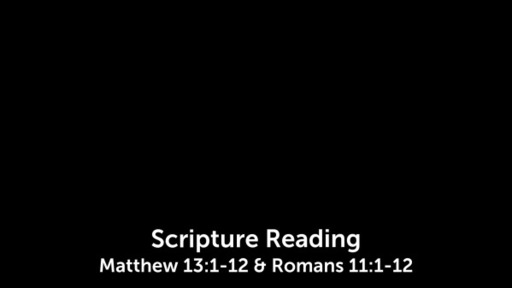Conditions for Growth

Sermon • Submitted • Presented • 18:11
0 ratings
· 23 viewsFiles
Notes
Transcript
Jesus spent a day at the shore, but people still followed him.
There were so many people that Jesus had to get in a boat.
Thankfully, sound carries very well across the water.
In a sense, Jesus’ pulpit was a boat.
Jesus spoke in another parable.
Something very familiar to the people of his time.
Nearly everyone grew their own food if they owned land.
This parable was about a farmer sowing seed.
The seed fell onto four types of ground:
On a path, probably impacted by many travelers and devoid of soft soil for a seed to penetrate.
On rocky ground, with few places where there was soil.
Among thorny bushes or weeds that choke out any beneficial plants.
Finally, on good soil where the seeds could germinate, grow and become abundant.
Soil does not work itself into shape.
A plentiful garden does not sprout up on its own.
Careful gardeners don’t just spread seed anywhere.
They are careful to cultivate the ground and nestle the seed into the soil.
There is no happenstance to careful gardening.
Soil cannot condition itself.
There is no happenstance to who receives the Gospel and flourishes.
If we see the Sower here as God in Christ, and the soil as those who receive the seed, then the seeds are the workings of his grace through his teaching, miracles, and making a way for us to God through faith in him.
God created the field of soil, waters the soil, shines on the soil, and sows the seed.
Thankfully, God does not leave it entirely up to us to condition ourselves for growth.
John Wesley, as well as others, supposed most people hear the Gospel along the path.
If they do not lose it to other philosophies, many receive it while still hardened.
If they still do not lose it by continuing in sin, some endure and bear abundant fruit.
Yet, in every case, it is not will of God that hinders spiritual growth but a willingness to do otherwise.
When Jesus explains to his disciples why he speaks in parables, God makes the meaning plain to those he chooses.
We start out with disbelief and by God’s grace, we come to believe.
Listening to the word of God in Hebrew always implied obedience. Response was always expected. Then those who respond as taught can be assured of their faith in Christ.
In Romans 11, Paul points to God’s response to Elijah’s pleading against Israel because of their violence against prophets like him.
God responded that he gracefully kept for himself a remnant, because Israel did not achieve what it was pursuing.
Most let their hearts become hardened because they could not achieve absolute obedience to God’s commands.
By their stumbling, their disobedience, the grace of God would become abundant to others.
There are no conditions to God’s love, but how receptive we are to receiving God’s love has eternal consequences.
We must be willing and available to carry out God’s work in the world, otherwise the seed of his grace dries up and withers away.
When we pray the Lord’s Prayer, we God to give us our daily spiritual bread [sustain us by His Spirit], not let us stumble into sin when we are tempted, and bring us to a place of confession, so to receive and extend forgiveness.